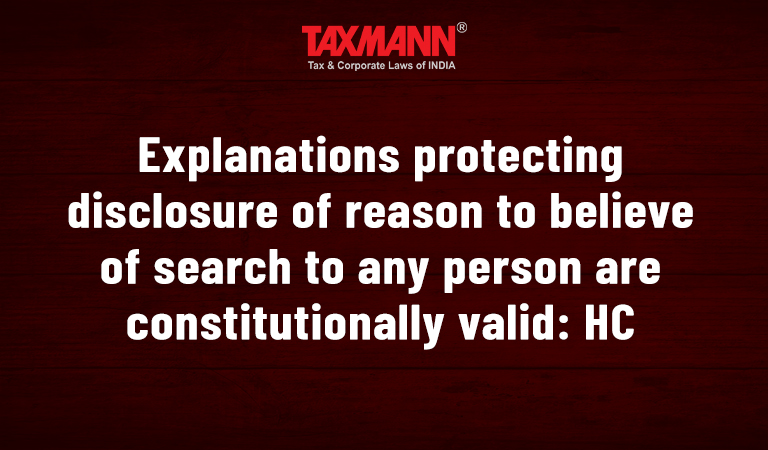Explanations protecting disclosure of reason to believe of search to any person are constitutionally valid: HC
- Blog|News|Income Tax|
- 2 Min Read
- By Taxmann
- |
- Last Updated on 18 August, 2022

Case Details: SRS Mining v. Union of India - [2022] 141 taxmann.com 272 (Madras)
Judiciary and Counsel Details
-
- Munishwar Nath Bhandari, CJ. & Mrs N.Mala, J.
- Mukul Rohatgi, A. Shankar, Sr. Counsels, Nithyaesh Natraj & Vaibhav R. Venkatesh for the Petitioner.
- R. Sankaranarayanan, Avinash Krishnan Ravi, CGSC, A.P. Srinivas, SPC & A.N.R. Jayaprathap, St. Counsel for the Respondent.
Facts of the Case
The instant writ petition was filed by the assessee seeking a declaration of Explanations to sections 132(1), 132(1A), and 132A as illegal, arbitrary, unreasonable, unfair, and violative of various articles of the Constitution.
Said Explanations provide that “reason to believe” in relation to search & seizure need not be disclosed to any person or any authority or the Appellate Tribunal.
It was submitted that the non-disclosure of “reason to believe” or “reason to suspect” to any person or any authority or the Appellate Tribunal would be nothing but to deprive the assessee or even the appellate authority to know the “reason to believe” or “reason to suspect”. Thus, it violates the principles of natural justice.
High Court Held
The Madras High Court has held that action to record “reason to believe” or “reason to suspect” is an administrative action and it does not form part of the assessment itself. The addition of the explanations is to serve the object for which the amendment was made and it is not offending any of the constitutional provisions, including Articles 14, 19, and 21 of the Constitution of India.
It is also added that the CIT(A) cannot go into the adequacy of the “reason to believe”, since it is an administrative action. Owing to their nature, the Apex Court has from time immemorial held that the sufficiency or adequacy of the reasons cannot be gone into and the only aspect to be seen is whether the reasons have a rational connection or have a bearing on the formation of the belief.
Thus, the challenge to the addition of Explanations to Sections 132(1), 132(1A), and 132A(1) of the Income-tax Act of 1961 was summarily rejected.
Disclaimer: The content/information published on the website is only for general information of the user and shall not be construed as legal advice. While the Taxmann has exercised reasonable efforts to ensure the veracity of information/content published, Taxmann shall be under no liability in any manner whatsoever for incorrect information, if any.

Taxmann Publications has a dedicated in-house Research & Editorial Team. This team consists of a team of Chartered Accountants, Company Secretaries, and Lawyers. This team works under the guidance and supervision of editor-in-chief Mr Rakesh Bhargava.
The Research and Editorial Team is responsible for developing reliable and accurate content for the readers. The team follows the six-sigma approach to achieve the benchmark of zero error in its publications and research platforms. The team ensures that the following publication guidelines are thoroughly followed while developing the content:
- The statutory material is obtained only from the authorized and reliable sources
- All the latest developments in the judicial and legislative fields are covered
- Prepare the analytical write-ups on current, controversial, and important issues to help the readers to understand the concept and its implications
- Every content published by Taxmann is complete, accurate and lucid
- All evidence-based statements are supported with proper reference to Section, Circular No., Notification No. or citations
- The golden rules of grammar, style and consistency are thoroughly followed
- Font and size that’s easy to read and remain consistent across all imprint and digital publications are applied



 CA | CS | CMA
CA | CS | CMA
